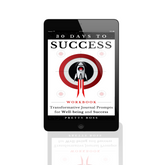⏳ 8 min read | by Pretty Boss
Why Mastery is a Journey, Not a Destination
When most think of mastery, they imagine it as a singular moment of triumph. We envision the point at which we can finally declare, “I’ve made it.” But this perspective couldn't be further from the truth. Mastery isn’t about arriving; it’s about transforming. Mastery is a lifelong journey that continually challenges us to grow, refine, and expand.
In this discussion, we’ll explore why mastery is a dynamic process, not a static endpoint, and how embracing this truth can transform your approach to growth and success.

The Illusion of Mastery as a Destination
One of the greatest misconceptions about mastery is the belief that it’s a final destination—something to achieve and then rest upon. But this mindset is dangerous. It causes many to stop striving once they’ve reached a certain level of competence or success, which inevitably leads to decay.
Take a moment to reflect. Can you recall a season in your life when you felt grounded, confident, and successful? A time when everything seemed to flow naturally and with ease? Yet now, it feels like a distant memory, and you find yourself living in the shadow of your past self. If this resonates, it’s because you became complacent. Anyone who lingers in complacency too long will eventually witness the mastery they once built deteriorate—often because they’ve lost touch with the habits and routines that created that mastery in the first place.
This highlights why viewing mastery as a destination is so limiting. It cultivates complacency and stagnation, cutting off the potential for ongoing growth. Consider, for instance, a professional who achieves a major milestone, like a promotion or an award, and then stops pursuing new challenges. Over time, their skills become outdated, and their edge fades. Don’t let this be your story.
The True Nature of Mastery
In reality, mastery is not a fixed state of being. It’s a process of continuous refinement. It’s about striving for excellence, not perfection, and recognizing that there is always more to learn, improve and achieve.
At its core, mastery follows a cyclical path, much like The Master’s Ladder framework:
1. Awareness: Recognizing where you are and where you want to be.
2. Learning: Gaining the knowledge and skills required to progress.
3. Application: Putting that knowledge into action through deliberate practice.
4. Wisdom: Transforming experience into deep insights.
5. Flow State: Operating in your genius zone with seamless efficiency.
6. Mastery: Achieving a level of expertise that opens new doors for growth.
What makes mastery truly unique is that it’s self-repeating. Every time you reach the top of the ladder, you gain awareness of new challenges or higher goals, and the cycle begins again.
Real-World Examples of Mastery as a Journey
Consider the late Kobe Bryant, one of the greatest basketball players in history. THEE GOAT in my book. Even at the peak of his career, after earning championships and MVP titles, Kobe remained committed to his craft. He was known for shooting hundreds, sometimes thousands, of shots daily, perfecting his form and pushing his limits. For Kobe, mastery wasn’t about reaching the top and stopping—it was about the daily grind, the relentless pursuit of getting better, and maintaining the habits that built his greatness. His legacy is a testament to the idea that mastery is not a destination but an unending journey of dedication and discipline.
Similarly, a successful entrepreneur who has scaled their business to six figures understands that reaching seven figures requires a new level of learning and application. They must revisit the process of becoming aware of their limitations, acquiring new strategies, and executing them effectively.
Both of these examples illustrate that mastery is a mindset. It's a commitment to perpetual growth and innovation.

Challenges of Viewing Mastery as a Journey
Initially, acknowledging that mastery is an ongoing process can feel discouraging. It requires humility to accept that there will always be more to learn and courage to step into the unknown continually.
Common Challenges of Mastery:
-
Emotional Toll: Constant growth can feel overwhelming if not balanced with rest and celebration.
-
Ego Trap: Past achievements may create a false sense of security, which leads to stagnancy and resistance to further growth.
Solutions:
✅ Celebrate milestones as markers of progress, not endpoints.
✅ Cultivate resilience by embracing the discomfort of growth as a necessary part of the process.
Benefits of Embracing Mastery as a Journey
When you shift your mindset to see mastery as a journey, the rewards are profound:
✅ Growth Mindset: You become adaptable, curious, and open to new opportunities.
✅ Sustained Motivation: Without the pressure to “arrive,” you remain inspired to keep improving.
✅ Legacy Building: Continuous refinement allows you to create lasting impact and inspire others to do the same.
Actionable Steps to Stay on the Journey
1. Self-Reflection: Regularly evaluate your progress and set new challenges.
2. Continuous Learning: Dedicate time each day or week to acquire new knowledge or skills.
3. Seek Mentorship: Surround yourself with people who push you to grow.
4. Use The Master’s Ladder Framework: Identify where you are on the ladder and focus on the next step.
Reflection
Mastery is not about perfection or finality; it’s about the pursuit of excellence through continuous growth and. By embracing mastery as a journey, you unlock the potential to achieve greatness in every aspect of your life.
Where are you on your journey to mastery? Share your thoughts or challenges in the comments below. I’d love to hear your perspective and help you take your next step.
If you're ready to accelerate your growth, check out my 30 Days to Success Course.a powerful system designed to guide you through actionable steps toward your goals. Let’s climb The Master’s Ladder together!






















